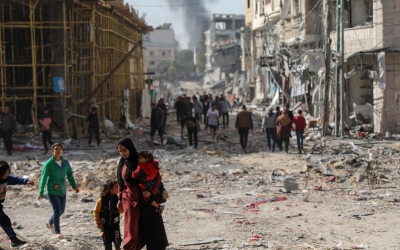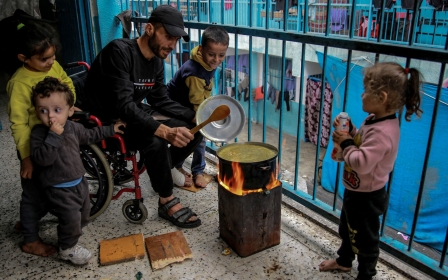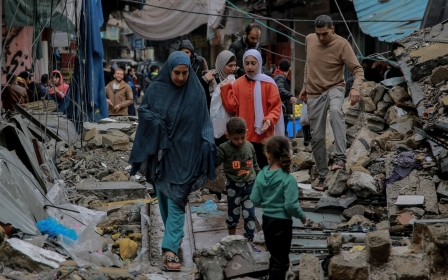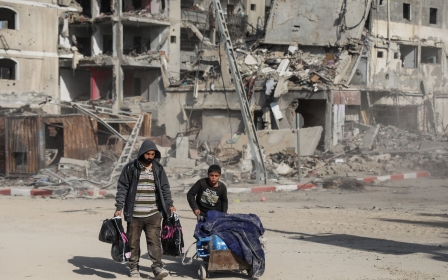Israel-Palestine war: Gaza’s main public library destroyed in Israeli bombing
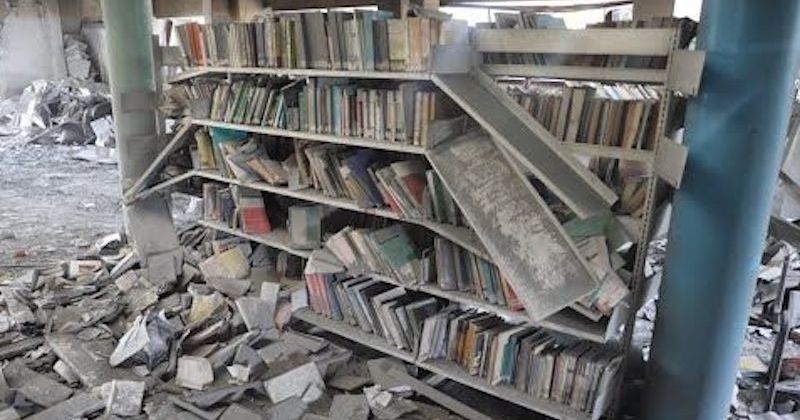
Palestinians inspecting the destruction wreaked by the Israeli military have been dismayed to find Gaza’s main public library in ruins following at least seven weeks of bombing.
A temporary truce came into effect on 24 November, with the cessation of bombing allowing Palestinians to see loved ones, attempt to find food and return to their homes to check up on the damage.
Authorities in Gaza announced on Monday that the pause in fighting has revealed that Gaza City’s main public library was among the many civilian buildings destroyed during the war.
Officials have decried the bombing of the building as a “deliberate attempt to destroy historical documents and books”.
Photos of the destroyed building, with books scattered around on the floor, were released by the Municipality of Gaza.
New MEE newsletter: Jerusalem Dispatch
Sign up to get the latest insights and analysis on Israel-Palestine, alongside Turkey Unpacked and other MEE newsletters
The library was in regular use by members of the community, including schoolchildren, before the start of the war on 7 October.
Video footage shared by Storyful, an intelligence agency and open source intelligence and verification platform, showed the destroyed building and the collapsed bookshelves inside.
Municipal authorities in Gaza have called for the intervention of the United Nations Educational, Scientific and Cultural Organisation (Unesco) to “intervene and protect cultural centres and condemn the occupation’s targeting of these humanitarian facilities protected under international humanitarian law”.
Erasure of culture
Literary Hub, a daily literary website launched in 2015, compared the bombing of the library to the 1992 attack on the library in Sarajevo, where Bosnian Serb forces, stationed in the hills above the city, razed the National and University Library of Bosnia and Herzegovina to the ground.
“The targeted destruction of Gaza’s primary public library is a stark reminder that genocide is about more than just the premeditated mass extinguishing of human life; it’s also about the calculated, and often vindictive, destruction of a people’s culture, language, history, and shared sites of community,” Literary Hub said in a statement.
They added that Israel’s destruction of cultural and historical sites in Gaza was a “way for Israel to erase all evidence of Palestinian life and Palestinian humanity”.
Online, people shared their feelings of sadness at the loss of the library, coining the world "culturecide" to show that a "cultural genocide" is underway.
“As someone whose sister was killed after trying to save books from the burning National Library in besieged Sarajevo in '92, I ache at such vile acts of destruction. Books have real and symbolic meaning: once gone, people feel lost and disconnected,” one social media user wrote.
Since the start of the war, over 60,000 buildings have been damaged in Gaza, including most of the buildings in the north.
While the bombing has destroyed 56,450 housing units, according to Euro-Med Monitor, places of worship, media offices, hospitals and universities have also been damaged.
The Islamic University of Gaza was one of the buildings bombed by Israel, which the Israeli army alleged was a “central training centre for Hamas engineers and a training institution for the development and production of weapons”.
Videos shared online showed Israeli military fighter jets targeting the Gaza City campus. According to Euro-Med Monitor, at least 266 schools have also been destroyed in the bombings.
The rights group highlighted that Gaza's oldest mosque, the Al-Omari Grand Mosque, famed for its minaret dating back 1,400 years, has been damaged along with three historic churches, among them the Church of Saint Porphyrius, which was originally constructed in around 407 AD.
“Various cultural institutions have also been targeted by Israeli attacks, including at least six cultural centres and five bookstores which are now destroyed; most notably, these are the Orthodox Cultural Centre, Al-Qarara Cultural Museum (which was built in 1958), and the Rafah Museum,” said Euro-Med Monitor.
This is not the first time bookshops and libraries have been targeted in Israeli bombing in Gaza.
In May 2021, a bookshop named Iqraa al-Jadeed in Gaza was reduced to rubble when Israeli jets pummelled the store during an 11-day bombing campaign.
A video of the owner, Shaaban Aslem, tearfully describing the sacrifices he made to open his shop in front of its wreckage quickly went viral, gaining the attention of thousands of people globally.
“I kept building it up, book by book, until it was complete," Aslem told Middle East Eye at the time. "The bookshop supported my family, and my extended family, around 22 people.”
Middle East Eye delivers independent and unrivalled coverage and analysis of the Middle East, North Africa and beyond. To learn more about republishing this content and the associated fees, please fill out this form. More about MEE can be found here.


